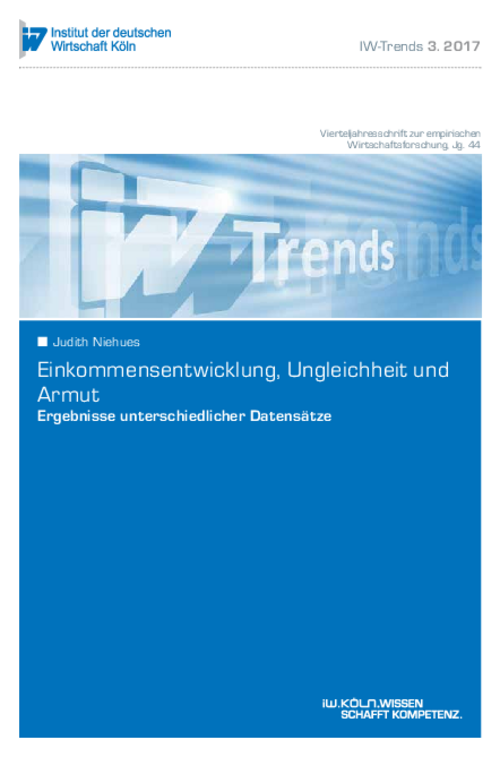The issue of inequality has been receiving more and more attention in public and media debates. This was especially the case in the run up to the 2017 Bundestag elections, when academic studies and reports in the media drew a gloomy picture of how incomes and inequality were developing in Germany

Income Development, Inequality and Poverty: The Results of Different Data Sets
IW-Trends

The issue of inequality has been receiving more and more attention in public and media debates. This was especially the case in the run up to the 2017 Bundestag elections, when academic studies and reports in the media drew a gloomy picture of how incomes and inequality were developing in Germany
However, the much cited and particularly alarming finding that since reunification the poorest two quintiles of the population had registered hardly any real income growth does not stand up to scrutiny. With a slight shift in the start of the monitoring period and adjustment for changes in the sampling method, what was presented as a real rise of only 1 per cent turns into growth of nearly 8 per cent over the last 20 years. Most importantly, in relative terms the lower income groups have shared the positive economic development of the past decade equally with the middle and upper income groups. This is also reflected in the stable income distribution since 2005. Unlike inequality, the risk of poverty has been on the rise again since about 2010. However, this issue needs to be evaluated separately as it is linked, among other things, with the influx of refugees over the past few years. In general, the debate on inequality and poverty is being increasingly marred by the uncritical representation of discontinuities in the time series as real changes. The present paper promotes a more critical approach to the underlying data sets and advocates the use of plausibility tests.

Judith Niehues: Einkommensentwicklung, Ungleichheit und Armut
IW-Trends

More on the topic

A Macroeconomic Analysis of Wage-Price Spirals
The subject of this Analysis is the forms that wage-price spirals can take and how they influence macroeconomic stability and inflationary trends in Germany.
IW
IW Distribution Report 2023: Attitudes towards social mobility
Fundamentally linked to the social market economy is the idea that everyone has the opportunity for social advancement, regardless of their social background, and that children should be better off than their parents.
IW